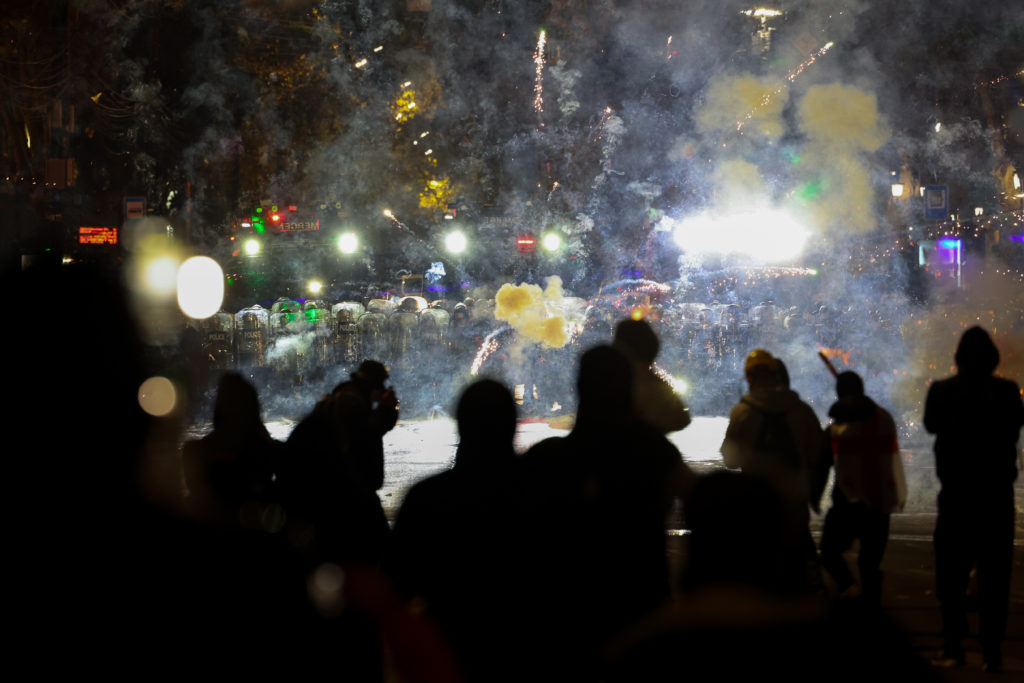Thousands of pro-EU protesters rallied Wednesday in Georgia for a seventh consecutive night of post-election unrest, after police raided opposition party offices and made arrests following the prime minister’s threat to punish opponents.Tbilisi has been rocked by turmoil since the ruling Georgian Dream party claimed victory in an October 26 parliamentary election denounced by opposition groups as rigged. Tens of thousands have taken to the streets to protest the alleged fraud.Prime Minister Irakli Kobakhidze’s announcement last Thursday that Georgia would not hold EU membership talks until 2028 sparked uproar and a fresh wave of rallies.Around 300 people have been detained and dozens, including protestors and police, injured in clashes outside the parliament building in central Tbilisi.Several thousand protesters, many wrapped in EU and Georgian flags, gathered outside the Georgian parliament Wednesday evening, some holding lit candles, an AFP reporter saw.”We are on the right side of history,” read one banner, as the crowd sang the Georgian national anthem amid a heavy police presence.As on previous nights, some demonstrators banged on the metal barriers blocking the parliament’s entrance, and aimed green lasers to dazzle police officers lined up in front of the building.Many came equipped with diving goggles or surgical masks to protect themselves from the tear gas heavily used by police during previous clashes.Eka Moniava, a 50-year-old artist, said the protest movement was at a pivotal moment, and “people are getting angrier and angrier”. Hours before the protest, police arrested seven people for “organising and leading group violence” at pro-EU protests in Tbilisi after searches of opposition party offices and activists’ homes.The ministry said in a statement that the suspects, identified only by initials and dates of birth, could face up to nine years’ imprisonment if convicted of “violent actions” during the mass protests held nightly since last Thursday.Opposition leader Nika Gvaramia, of the Akhali party, was beaten and arrested during a police raid of the offices of another opposition party, Droa.The independent Pirveli TV station reported that two other opposition leaders, Alexandre Elisashvili and Zurab Datunashvili — a two-times world wrestling champion — were arrested late Wednesday near the protest, during a scuffle with plainclothes security agents allegedly deployed to target government critics.Earlier on Wednesday, Prime Minister Kobakhidze vowed to crack down on what he called “radical” political forces responsible for organising the protests.”It is clear to everyone that these violent actions are entirely coordinated by the radical opposition… No one will escape accountability, including the politicians hiding in their offices,” he said.- ‘Trumped-up charges’ -Droa leader Elene Khoshtaria said on X: “They are now in our party office, searching. Likely hoping to find something to charge some of our members with trumped-up charges.”Police said they also raided offices of the Youth Organisation of the opposition United National Movement (UNM) party.UNM in a statement accused the Georgian government of launching “all-out terror and repressions against opponents”.Over six consecutive nights of protest, demonstrators have hurled fireworks at riot police, who have deployed water cannon and tear gas and charged protesters.At least 15 people were admitted to hospital after Tuesday night’s demonstrations, officials said Wednesday.A thick grey fog of tear gas has blanketed Tbilisi’s central Rustaveli Avenue, with several rallies lasting until dawn.- ‘Torture’ -In the face of international condemnation of overuse of police force, Kobakhidze has refused to back down.The state would take “all necessary measures” to quash the “revolution” being plotted by the pro-Western opposition, he said.Several demonstrators, including journalists, have been hospitalised after being detained and, they allege, beaten by the security forces while in custody.Rights ombudsman Levan Ioseliani has accused the police of using “torture” against those detained at rallies.Critics of the government have been enraged by what they call its betrayal of Georgia’s bid for EU membership, which is enshrined in its constitution and supported by around 80 percent of the population.Several ambassadors and a deputy foreign minister resigned over Georgian Dream’s decision to suspend EU accession talks for four years.- Pro-Russia slant -Georgian Dream is seeking to remove the country’s pro-EU president Salome Zurabishvili from power before the end of the year.Critics accuse Georgian Dream of moving closer to Moscow, despite strong anti-Russian sentiment across Georgian society.Since 2022, Georgian Dream has advanced Russia-style legislation targeting civil society and independent media outlets, as well as curbing LGBTQ rights.Moscow has appeared to back Georgian Dream during the protests, saying the authorities there were working to “stabilise” the situation.
Wed, 04 Dec 2024 20:16:47 GMT










